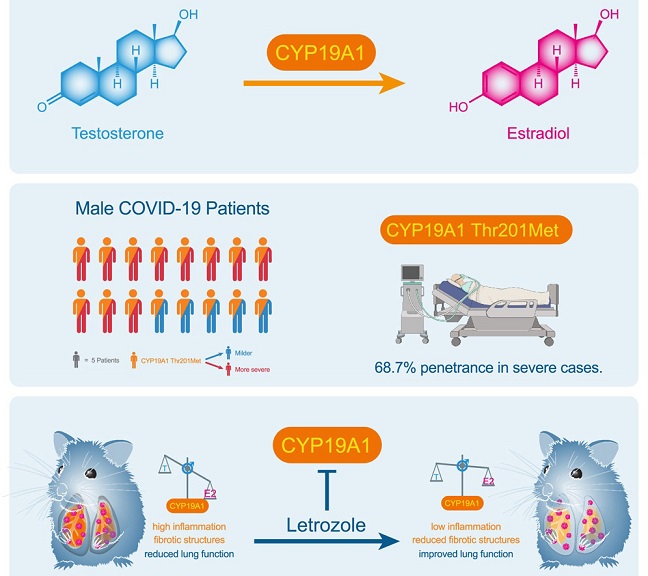COVID-19-Genetics: German Study Finds That CYP19A1 Gene Contributes To COVID-19 Disease Severity In Males
Thailand Medical News Team Aug 14, 2023 1 year, 8 months, 1 week, 4 days, 14 hours, 51 minutes ago
COVID-19-Genetics: Since its emergence in late 2019, the COVID-19 pandemic has wreaked havoc across the globe, resulting in millions of infections and deaths. Among the many factors contributing to disease severity, gender has emerged as a significant determinant, with males facing a higher risk of severe outcomes compared to females. Although this sex-dependent disparity has been widely recognized, the underlying genetic and molecular mechanisms driving this phenomenon have remained largely enigmatic.
 Graphical Abstract
Graphical Abstract
A new
COVID-19-Genetics study conducted by researchers at the Leibniz Institute of Virology in Hamburg, Germany, has shed new light on this issue by identifying a crucial genetic factor, the CYP19A1 gene, which plays a pivotal role in exacerbating COVID-19 severity among males.
Unraveling the Role of CYP19A1 Gene
The CYP19A1 gene encodes an enzyme known as aromatase, responsible for the conversion of testosterone into estradiol, a potent form of estrogen. In the study, the researchers meticulously analyzed extensive exome sequencing data obtained from a human COVID-19 cohort comprising 2,866 individuals. Utilizing advanced machine-learning techniques, they honed in on a specific CYP19A1 genetic variant called Thr201Met, which exhibited a significant association with the development of severe COVID-19 symptoms exclusively in males. Notably, this genetic variant was found to increase CYP19A1 enzyme activity, leading to an imbalance in sex hormone levels.
The Link between CYP19A1 and COVID-19 Disease Severity
To further validate their findings, the study team turned to human autopsy-derived lung tissues from deceased COVID-19 patients. Astonishingly, the lungs of male patients displayed heightened expression of the CYP19A1 gene at the time of death, even when viral RNA was no longer detectable. This observation suggested a potential connection between elevated CYP19A1 expression and the exacerbation of disease severity in males.
Hamster Model Insights
To delve deeper into the role of CYP19A1 in COVID-19 severity, the researchers employed a well-established golden hamster model. Male and female hamsters infected with SARS-CoV-2 exhibited comparable weight loss during the acute phase of infection. However, as the recovery phase ensued, male hamsters displayed delayed weight gain and impaired lung function, persisting even after virus clearance. These deficits were linked to altered gene expression profiles in the male lungs, including increased CYP19A1 expression and elevated levels of the estrogen receptor ESR-β. I
ntriguingly, dysregulated plasma sex hormone levels, marked by reduced testosterone and elevated estradiol, were detected exclusively in males.
The Therapeutic Potential of Letrozole - A CYP19A1 inhibitor
To investigate the therapeutic potential of targeting CYP19A1, the study team administered letrozole, a clinically approved CYP19A1 inhibitor, to SARS-CoV-2-infected hamsters.
Notably, letrozole treatment restored balanced sex hormone levels in both male and female hamsters. However, its effect was particularly pronounced in males, leading to improved lung function and accelerated recovery. Mechanistically, letrozole treatment modulated key pathways associated with lipid metabolism and protein phosphorylation, further underlining the importance of sex hormone balance in maintaining lung health.
Implications and Future Directions
This new study not only uncovers the role of genetics in shaping COVID-19 severity but also offers a potential avenue for therapeutic intervention. By targeting the CYP19A1 enzyme with letrozole, researchers have demonstrated the ability to mitigate disease severity in male hamsters. While this holds promise, the translation of these findings to human patients requires careful consideration of the complexities of hormonal regulation.
However, several limitations must be acknowledged. The study primarily focuses on genetic associations and requires further investigation into the mechanistic pathways linking CYP19A1 to COVID-19 severity. Moreover, while letrozole shows promise in hamsters, its efficacy and safety in human patients necessitate rigorous clinical trials.
Conclusion
In conclusion, the Leibniz Institute of Virology's pioneering study has illuminated a critical piece of the puzzle underlying the gender-based disparity in COVID-19 severity. The identification of the CYP19A1 gene and the potential therapeutic application of letrozole represent significant strides toward personalized and effective treatments for severe COVID-19 cases, particularly in males. As the global fight against the pandemic continues, these findings offer renewed hope and direction in the quest to save lives and restore health.
The study findings were published in the peer reviewed journal: Cell Reports Medicine.
https://www.cell.com/cell-reports-medicine/fulltext/S2666-3791(23)00305-1
For the latest on
COVID-19-Genetics, keep on logging to Thailand Medical News.
